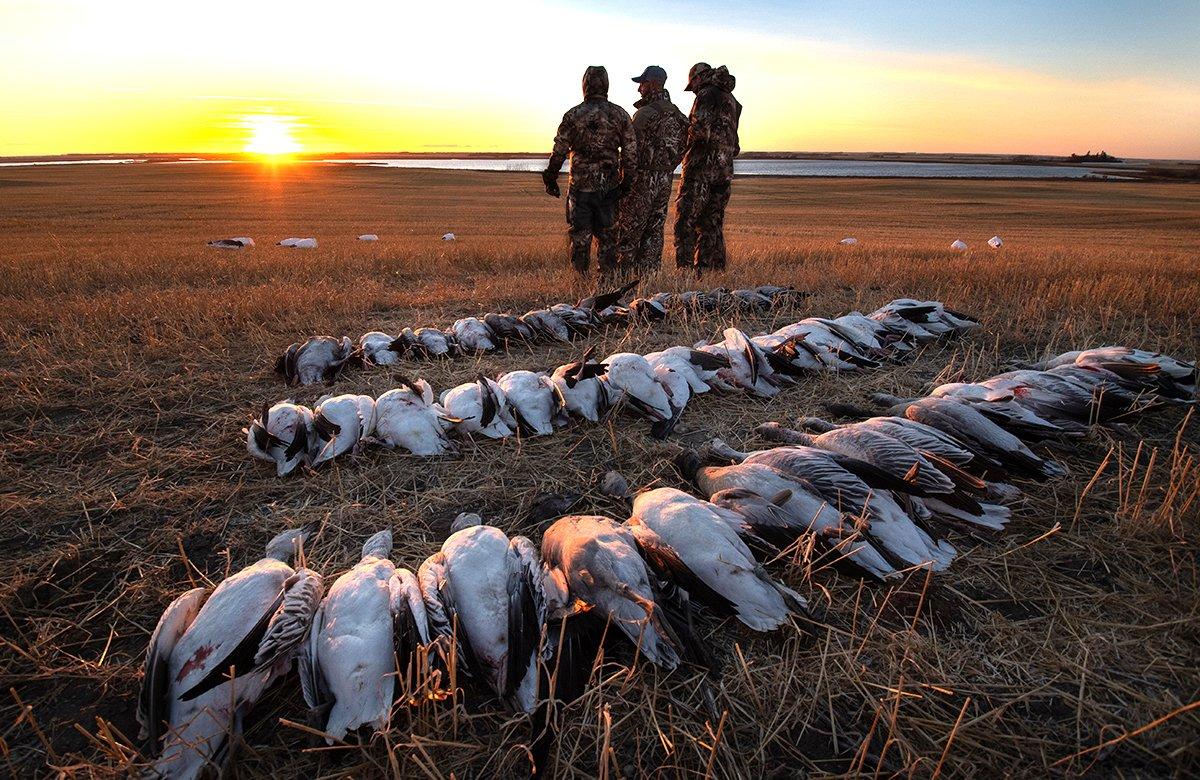Tips to help you find the type of hunt you want, with your best shot at an epic day
Unless they have excess vacation time, several trailers packed with decoys and an unlimited fuel budget, most spring snow goose hunters book with a guide to (hopefully) assure a quality experience.
But laying down your cash is the easy part. Before that occurs, you should thoroughly investigate outfitter options and ask a lot of questions to make sure you're choosing the right guide and getting the most for your money. Spring light-goose hunting is labor intensive and can be extremely hit-or-miss, so you want to book with a pro.
Of course, that prompts an obvious question: How do you find the best spring snow goose guide for your situation? We asked several professional outfitters for their tips.
“There are a ton of questions to ask a guide, but first you need to identify what you're looking for as a guest in the snow goose experience,” says Tony Vandemore, owner of Habitat Flats and longtime snow goose outfitter.
Vandemore says hunters should ask prospective outfitters about accommodations and meals, as packages vary. Further, they should specify if they want the outfitter to handle all decoy placement and other chores or whether they're willing to participate in those tasks. Also, hunters need to ask about daily details.
“Are you willing to lay in the mud, or would you prefer a heated, comfortable pit?” Vandemore says. “Are you looking to hunt all day or just the morning? You should ask your guide what situations they are hunting: permanent sets versus hunting feeds, and who puts the decoys out. What does a typical day look like? How long do you hunt? Do you come in for lunch and a nap or have lunch brought to the spread? What clothing and gear does your guide recommend bringing?”
Graham Greseth, owner of MaXXed Out Guides, who guides spring snow goose hunters in Kansas and South Dakota, says the spring snow goose craze has spawned many fly-by-night outfitters, so hunters should seek a guide that's experienced and professional.
“I would be very cautious of any spring snow goose outfitter that doesn't have a website — that just runs off social media,” he said. “You want to go with someone who's been around the block. You want to know they're still going to be there in spring.”
Eric Rinehart, of North Delta Outfitters in southeastern Missouri, says old-fashioned word-of-mouth reviews can provide hunters with solid clues about outfitters they can trust.
“It's not hard to get on social media or ask around,” he says. “You're going to know pretty quickly who to go snow goose hunting with and who not to. Snow goose hunters talk, and they spread the word about whether you're taking money and doing a good job or taking money and not doing a good job.”
Rinehart and Greseth agree that the fee an outfitter charges can also indicate the quality of the operation. Outfitters who charge low rates might not have the resources required to produce consistently, and their cheap fees essentially admit they're offering an inferior product. Outfitters who charge more, however, can afford to pay several guides, scout consistently and find ideal setups.
“Just like anything in life, you get what you pay for,” Greseth says, adding a tongue-in-cheek warning. “Cheap snow goose guides are typically the most expensive trip you'll ever make.”
Vandemore also offers a caveat about expectations. Many hunters love spring snow goose season because of the chance for high-volume gunning and lots of birds. However, they often fail to remember that changing conditions and the chaotic pace of the migration can make hunting tough at times.
“Weather is a major player when it comes to snow goose hunting,” he says. “When booking a three-day trip several months in advance, you're looking for one really good day out of three. You could get three days of clouds, no wind or rain, and it might be terrible. But on the flip side, you could get three days of sun and wind, and the sky is the limit. Big days happen — when you kill over 100. They aren't made up. But you're going to have far more 10- to 40-bird hunts than 100-bird days.”
Click here for more Realtree waterfowl hunting content. And check us out on Facebook.







